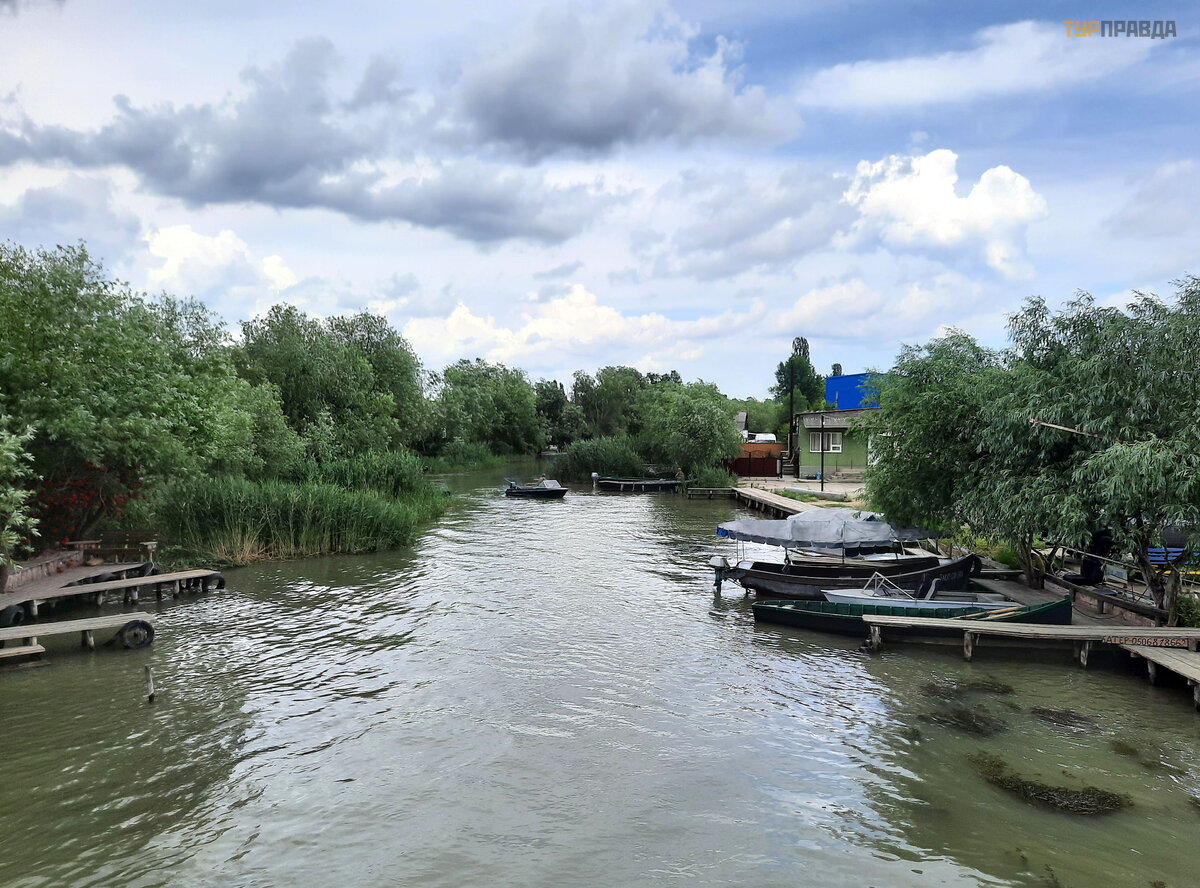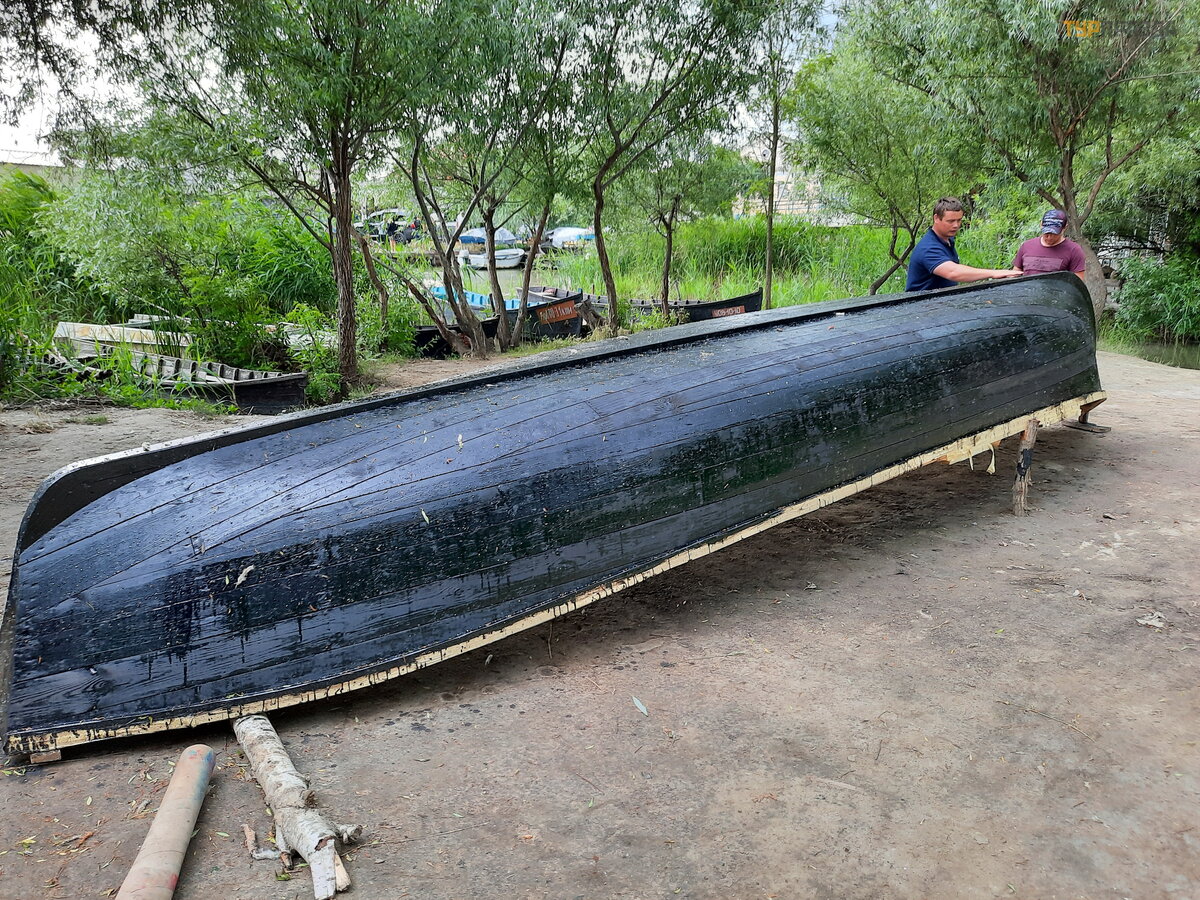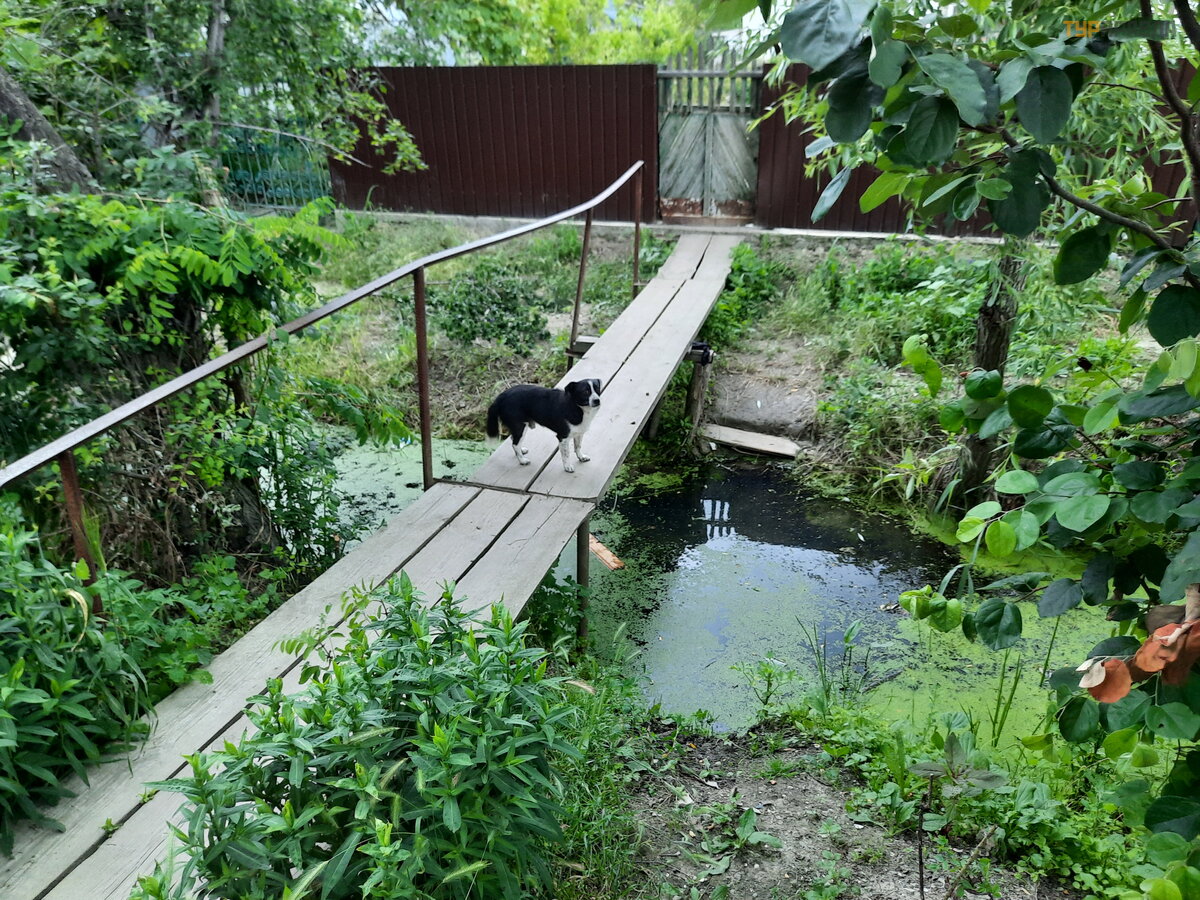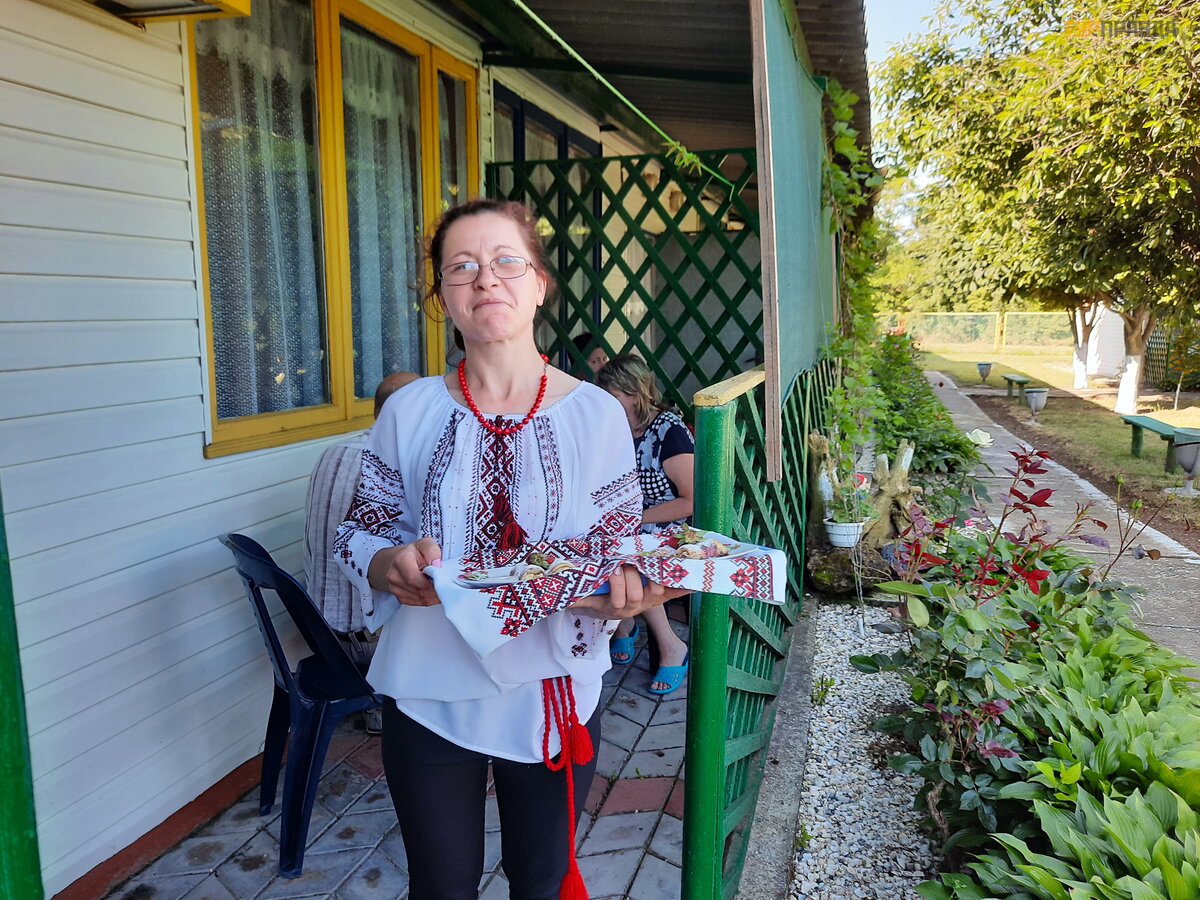"Ukrainian Venice"
Such a cozy, quiet town!
It's on the Danube, right on the border.
Who stayed in it for at least one day,
Will definitely want to come back.
There, instead of the streets, eriks flow,
The houses stand on whitewashed piles,
In spring, early apple trees bloom,
And on May Day the frogs sing.
High in the mountains, in the German Black Forest, two mountain streams Breg and Brigach merge. This is how the Danube begins, the only river in Europe, the length of which is measured not from the sources, but from the mouth. The landscape and originality of the Danube Delta, as well as the protected flora and fauna, made these places truly interesting for tourists. I have wanted to visit this region for a very long time, and finally, it happened - the weather for the weekend turned out to be not hot, my tour companions were free from family troubles, my health was stably normalized, and the weekend program was interesting. So, very early Saturday morning we set off on an exciting journey through the vast expanses of Bessarabia. They say that Greece has everything. I can state with confidence that we have the same “everything” in Ukraine. Even my own Venice. This is a unique town on the water - Vilkovo, which is the main outlet to the Ukrainian Danube Delta. literally on the islands, 19 km. from the Black Sea.
First, we will take a boat trip along the arms or, as they are called here, the arms of the Danube. At the seaport, we board a boat that has seen all the sea and river elements with the gentle name "Lebedinka".
We take places according to the championship in the race, since they are not indicated on the tickets, and go on a cruise to the so-called "Kilometer Zero", where the Danube flows into the Black Sea. Here, you can see the treasured number 19, which means the number of kilometers that we need to overcome in order to see the sea. (this is the ship's captain and senior officer named Rex)
Nearby, another ship, apparently returning from the Japanese war, is gently swaying on the waves. But we definitely won’t sail on itwon’t go, because there is a great risk of not getting to the sea.
The sea station is quite small, rather it is just a pier where unpretentious local transport moored.
It is not necessary to charter a large boat, it is quite possible to sail there by boat, but only a light breeze will envelop you with splashes of anything other than champagne, and in addition to water procedures, an anti-cellulite program will be added, given the rigidity of the seats during an hour and a half walk.
It is possible, of course, on a motorboat, but the small capacity of the boat does not suit us.
Therefore, the best option, so as not to sacrifice comfort, is to choose a boat.
And right from the seaport where the Lipovanin monument was built, I begin to learn the history of these places.
It turns out that the Lipovans are the Old Believers who appeared here in the 18th century as a result of the reform of Father Nikon, which led to a split in the Orthodox Church. The Old Believers, persecuted by the new Orthodox, could not find shelter anywhere, and were forced to stop in impassable floodplains in a swampy area. There are several versions of the origin of the term "Lipovans". But I liked the version of the locals most of all: “They call us Lipovans, because there were a lot of Vaneks here, they came running to us from the linden forests, and they were all false. ” The fact is that not only the Old Believers live in Vilkovo, but also the descendants of the Cossacks of the last Sich. And since they have different currents in religion and different views on life, they do not really respect each other. And even if someone from the opposite camp wandered into another part of the city and asked for water, then the cup from which he drank would be called "nasty".
Where does the name Vilkovo come from? And everything is very simple. The river here is divided into three powerful branches, which form a fork. These are Kiliya, Ankudinovsky and Ochakovsky branches. The largest is Ankudinovsky.
To the right, the girl goes to Romania
And we turn into the left sleeve and go to the picturesque Danube Delta of Ukraine.
On both sides of the sleeve, on the islands, there are cottages and vegetable gardens. Some simply have a hut on chicken legs, a fragile boat, and a ditch for irrigation.
Others look more presentable and already have a motorboat
In addition, recently green tourism is gaining more and more popularity.
Many residents of Vylkove convert their dachas and gardens into tourist camps, one of which we will stop by on the way back to treat ourselves to delicious fish soup cooked according to old Lipovan recipes. Although the recipe for cooking any fish is simple - it must be freshly caught. What we are seeing is the process of cleaning the Danube carp for our fish soup.
The area of wetlands belongs to the Danube Biosphere Reserve - a habitat for waterfowl. And there are more than 250 types!
There is even a pink pelican here, the curly pelican is especially good. I managed to take them off only from a distance
But I found a photo of a curly pelican on the Internet
The reserve is, of course, unique. 950 species of plants grow here, and more than 5 thousand species of animals were counted in general, including wild mustangs. But meeting with them does not bode well for the traveler, therefore, the fact that we did not meet them is a good sign.
But the most important inhabitants of the protected area are fish. Therefore, almost all the inhabitants of the town are engaged in fishing. The famous Danube herring is especially famous. In early spring, during the fishing season, fishermen work day and night, getting Danube gold from the depths of the sea, which will then feed their families for a whole year. Often, wives go fishing with their husbands, while doing, from their point of view, the easiest job, namely rowing (this news drove me into a stupor), because men have more difficult work, they need to spread, and then collect heavy nets with a catch. A paddle for rowing is funny called "babyka". Therefore, if a husband behaves badly, his wife threatens him with a babayka. But these places are famous not only for herring, in the waters of the Danube there are many fish included in the European Red List - salmon, spike, Atlantic sturgeon. And all the fishermen are waiting for their luck - to catch not a goldfish, but a real sturgeon, then it will be possible to buy a new boat and improve their life. And for a Vilkovian, a boat is not just a means of transportation, it is a breadwinner that is cherished, repaired and cherished.
The water in the Danube is cloudy brownish in color, but this is not due to pollution of nature, this fact is simply the result of the presence of a muddy bottom. River reeds grow everywhere, incorrectly called reeds by us, which serve as a covering for the roofs of houses. This cane is harvested locally, and even exported to Europe.
We arrive in the treasured zone.
Having landed on the island where the Danube flows into the Black Sea, we walk along the coast with the finest mother-of-pearl sand. And then, coming out of the jungle of lush vegetation, it opens up to our eyes, the highlight of the program is the symbol "About km" - the zero kilometer of Vilkovo.
Locals say with a smile that the “about km” sign has already been moved several times towards the sea, as the river annually causes a lot of land, lengthening the islands. But it doesn't matter to us. An obligatory ritual is to climb through the "zero" from the side of the sea, simultaneously making a wish and nullifying your sins.
In general, so far nothing new has been invented for tourists visiting various attractions, either to make a wish or to wipe the dust. In general, having walked in the direction of the sea and diving into the zero from different sides eleven times, we return to the Lebedinka, where the senior assistant captain, named Rex, checks the documents.
Having shown Rex the mustache and tail, we go to the Green Harbor camp site to visit the Lipovans in the ear. We are met, hidden in the Danube floodplains, by a green oasis of silence and coolness.
A fragrant fish soup smokes in the pot. After fresh air, vivid impressions of nature, you are guaranteed an excellent appetite!
Let's start the meal with real Lipovan treats. First, we are served a huge plate of sweet-spicy steaming Danube carp with young potatoes
It is noteworthy that the ear itself is poured not into plates, but into cups. First, you need to pour the fish abundantly with salamur sauce, and then eat it, washing it down with fish soup.
For dinner, dry wine is served from the Novak grape variety, which grows everywhere here. This is an analogue of the French variety "Noah", but since the word "novak" is consonant with the Lipovans, the grape variety was renamed with their light hand.
The meal dragged on, apparently fresh air, and delicious wine did their job, and our young ladies wanted to continue the banquet. Shish kebab, hood and other food appeared on the table. I realized that it was for a long time, and went to explore the territory. Rex volunteered to accompany me, either he was afraid that I would get lost, or he decided to work as a guide. But anyway, I was glad to have such company.
There is a large green area for relaxation in the harbor
There is even a monastery courtyard with a small wooden church (active)
Rex led me to a strawberry field. Oh well done! This is beauty! While my young ladies were enjoying barbecue, I was enjoying fragrant, environmentally friendly strawberries
And at the end of the meal, the hosts treated us to delicious fragrant herbal tea, brewed according to special monastic recipes. I don’t know what the secret of this tea is, but I couldn’t get drunk, I poured everything and poured myself the next cup from the samovar.
Well, rest is certainly good, but it's time and honor to know. Especially since we still wanted to see the city. We climb into our "Lebedinka" again and follow to Vilkovo, because only in this way can we see his face. But as it turned out, the face of the city is not very attractive. Earlier, back in Soviet times, Vilkovo was famous for its fishing industry all over the world, and there were five large fish processing plants on its territory. Now the main plant, or rather its remains look like post-war ruins.
The city is in decline. In order to have more or less solid ground under your feet, you need to dig canals, which are called eriki here, to protect yourself from floods. Eriki needs to be constantly deepened, covering the bottom with new silt. This is laborious and painstaking annual work, so the city thins out, only old-timers remain, and young people actively move to the mainland, closer to the conveniences of civilization.
Here to this day, houses are built from reeds, coated with clay. Housing comes out warm and light, heated mainly by wood or coal. And the measure of coal is determined not in tons, but in boats. Periodically, structures are raised, the foundation is built up and put back. In the old part of the city we walk along the narrow streets. Rather, there are no streets here, only canals and masonry.
The land here is of particular value, therefore, plants are planted in three levels: strawberries below, then grapes and pears on top of an apple tree. All this matures beautifully. And sales - by boats to Odessa. Since there are no cellars, you need to have time to sell all your goods before winter.
The population lives rather poorly. And as I said, the main occupations are fishing, growing early strawberries, pears, apples, and making homemade Novak wine. Well, in winter they harvest reed for export. Guests here also go exclusively by boat.
Since there is always water on one side, and land on the other, so-called masonry or bridges are laid to the houses.
In Soviet times, due to the proximity of the border, Vilkovo was a closed city. They are just getting used to tourism here. The Old Believers revere their traditions very much and regularly visit the temple. It is noteworthy that there are two Old Believer churches in the city, and only one is Orthodox.
And finally, some information about where to stay. For our parking, we chose the village of Lipovans - Old Believers "Primorskoye", located just 20 km. from Vilkovo. Base "Ukrainian Venice"welcome us with its colorful territory and cozy houses.
There is a playground on the territory
Fragrant flowers everywhere
In the morning, we were served a fresh breakfast on the terrace. Bali pancakes with currant jam are simply magical.
All staff in national costumes, which adds charm and color.
Having thoroughly refreshed, we follow the course to another object of our journey - to the city of Belgorod - Dniester, to see the most ancient fortress of Ukraine - Akkerman. (to be continued). From the cycle of stories "Amazing Ukraine".

















































































































